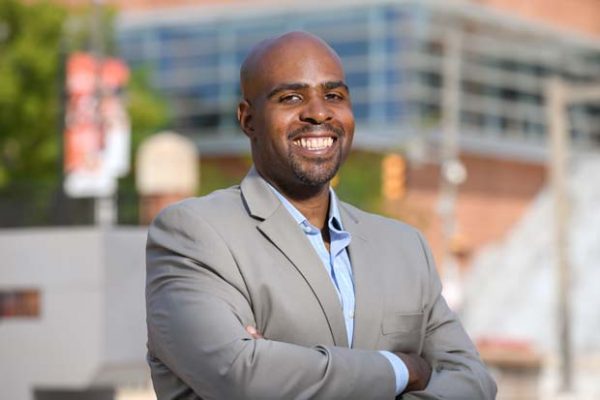Introducing new technology is not just about programming languages and applications, but also skills and culture.
That’s evident in the work of Babila Lima, the director of the Baltimore City Department of General Services’ (DGS) Business Process Improvement Office. He has worked in the city government since the Dixon administration, advocating for innovation and skills development over more than a decade.
The Department of General Services in itself is an arm of the government that manages equipment and buildings for different city agencies, as well as performs administrative tasks. The business process improvement office is Lima’s brainchild, where he has turned civic innovation into his day job.
His work boils down to this: Analyze a government processes and find ways to improve it. That could mean modernizing the process by turning a document-in-triplicate process into one that is paperless. Or, it could mean automating a process through coding that was done by an individual. In either case, the main issue isn’t in the tech solution. Rather, it is getting buy-in from employees whose jobs may be affected, and showing that their value isn’t being diminished or exploited.
“We needed to communicate that your job will become easier because there’s less manual effort you need to put in,” said Lima. “and you can use that time in a way that you determine is more productive.”
He’s often pushing against the mindset that increasing efficiency means increasing the workload at best, and working an employee out of the position at worst. He wants to change the way agencies work and prepare the government for the age of automation and software innovation that stands to make traditional bureaucratic pencil-pushing obsolete.
“It’s hard to talk about that transition without people feeling like you’re talking about replacing people,” said Lima. “That’s not the message. That’s not the goal. It’s more about readying agencies and organizations to meet the skills needs they’re going to have in the next ten to fifteen years.”
If they’re not ready, agencies might not only be ill-prepared for the technological future, but lose all of their institutional knowledge when all of their senior employees retire.
“In my agency alone, more than half of our folks are either retirement ready or eligible,” said Lima, and this isn’t unique to only DGS in his experience.

Inside the Python for City Government Process Improvement Meetup. (Courtesy photo)
Preparing for this eventual transition of human capital is why Lima feels an imperative to create programs like the Python for City Government Process Improvement meetup and internal Python training programs for city employees.
“He’s always thinking about process and lean government,” said Troy King, deputy chief financial officer of the department of general services. “His juices are always flowing, so it’s definitely a pleasure to have him on the team.”
King has started learning Python through a biweekly training group in DGS, and preparing for the future in city government that Lima sees. It’s one that is more tech-forward and utilizes software programming to provide better services to its constituents.
She has been using Python to automate tasks she typically does in Excel. Before the program King had no experience with Python but now, she looks at her work and sees opportunities to automate the repetitive data manipulation so she can focus on analysis.
“Once you learn one thing, especially in an environment where you can apply it to the real world, it just makes you want to evolve, keep learning and see where else you can apply it,” King said about the Python training.
All of Lima’s work — from improving process internally, creating spaces for private sector and public sector to transfer skills with the meetup, to expanding skill sets and investing in human capital within the government — is aimed at evolving government not just technologically, but also culturally. The goal is to create a work culture that’s as forward looking and collaborative as the technology it uses.
It’s “all to leverage these other partners and expose out business problems, opportunities and operationalize data to drive performance,” Lima said of the Python skills building and his work as a director. “Because we’re a small office, we can’t solve all the problems. And if we’re going to make services better for other agencies, we need to partner with other folks.”
Donte Kirby is a 2020-2022 corps member for Report for America, an initiative of The Groundtruth Project that pairs young journalists with local newsrooms. This position is supported by the Robert W. Deutsch Foundation.
This editorial article is a part of Civic Tech Month of Technical.ly's editorial calendar.
Before you go...
Please consider supporting Technical.ly to keep our independent journalism strong. Unlike most business-focused media outlets, we don’t have a paywall. Instead, we count on your personal and organizational support.
Join our growing Slack community
Join 5,000 tech professionals and entrepreneurs in our community Slack today!

Entrepreneurship is changing, and so is the economic development behind it

Tech Hubs’ new $210M funding leaves Baltimore and Philly off the table

Here’s what to know before using AI to craft your brand’s social media posts


